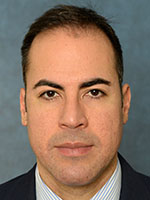Senior Reporter
Dwindling Highway Trust Fund? Not if Mayor Pete Has His Way

[Stay on top of transportation news: Get TTNews in your inbox.]
“Over the last four years, politicians in Washington have failed to deliver for the American people” is the claim from the recent infrastructure plan by 2020 presidential aspirant Pete Buttigieg, the former mayor of South Bend, Ind.
With the primaries heating up, Mayor Pete recently presented the public with an ambitious infrastructure proposal that castigates the Trump administration for not “keeping its promise to pass major infrastructure legislation.” To be sure, in 2018 the White House proposed a private sector-centric infrastructure proposal, which did not appeal to the Republican-led House and Senate.
In his 17-page proposal, Buttigieg covers everything from climate change and access to transit to repairing bridges and promoting safety. And similar to President Donald Trump, the mayor opted not to address the thorny issue of the fuel tax.

Mulero
In his plan, the mayor proposed to “inject” $165 billion to the Highway Trust Fund in an effort to ensure its solvency for nearly a decade. And while the trust fund is functioning temporarily, Buttigieg would call on his Department of Transportation to arrive at a new user fee-based system. He pointed to a vehicle-miles-traveled fee. “Within such a system, discounted rates can be offered on a sliding scale based on income,” according to the proposal. The question remains, where would this $165 billion come from? This kicking-the-can approach to highway funding is old hat in Washington.
There’s a reason why advancing comprehensive infrastructure legislation has been so difficult for transportation policymakers on Capitol Hill in recent years. Congress can’t agree on a sustainable source of funding for big-ticket projects. A prominent source of that funding is the Highway Trust Fund, which relies on insufficient revenue from the gas and diesel tax. Congress last raised the fuel tax during the Clinton administration. Since then, leaders have avoided asking the public to support such a tax increase, even if it meant improving infrastructure. (It’s been said Trump privately endorsed a 25-cent fuel tax increase.)
Pete Buttigieg's $1 Tri... by Transport Topics on Scribd
The Week Ahead (all times Eastern)
Spotlight
Jan. 12-16: The Transportation Research Board hosts its 99th annual meeting in Washington. Transportation Secretary Elaine Chao is scheduled to deliver keynote remarks Jan. 15. The secretary recently unveiled a new autonomous vehicles directive. She also has emphasized safety, innovation, and funding across rural areas. TRB will feature more than 5,000 presentations and hundreds of exhibitors addressing nearly every issue in transportation.
Jan. 14, 10 a.m.: The North American Council for Freight Efficiency has scheduled a conference call to discuss a recent report on fuel economy.
Jan. 14, 10 a.m.: The Senate Environment and Public Works Committee marks up the United States-Mexico-Canada Agreement Implementation Act.
Jan. 14, 10:30 a.m.: The Senate Budget Committee marks up the United States-Mexico-Canada Agreement Implementation Act.
Jan. 15, 10 a.m.: The Senate Health, Education, Labor and Pensions Committee marks up the United States-Mexico-Canada Agreement Implementation Act.
Jan. 15, 10 a.m.: The Senate Commerce, Science and Transportation Committee marks up the United States-Mexico-Canada Agreement Implementation Act.
Jan. 16, 10 a.m.: The Senate Foreign Relations Committee marks up the United States-Mexico-Canada Agreement Implementation Act.
Jan. 17, 1 p.m.: The U.S. Environmental Protection Agency hosts a teleconference of the Chartered Science Advisory Board to review proposed rules such as the National Emission Standards for Hazardous Air Pollutants.
Mood Swings
Indication from Speaker Nancy Pelosi (D-Calif.) that transportation leaders within her caucus intend to present a climate change-centric highway bill in the coming week has intrigued stakeholders throughout the transportation sector. Whether Congress manages to advance a comprehensive update of the 2015 FAST Act highway law before the law’s Sept. 30 expiration remains to be seen.
In Case You Missed It
If it sells, it’s commerce. If it moves, it’s transportation. And the commercial transportation sector has been very aware of the costs associated with building, maintaining, and upgrading corridors around the country. Tom Kertscher offers a reminder of America’s to-do list on its roads, bridges, everything else that connects passengers and commerce.
Out of the Running

Booker
One of the staunchest advocates in Congress for the improvement of freight and commuter access in the New York,-New Jersey-Connecticut region suspended his 2020 presidential run, just a few weeks prior to the Iowa Caucuses. New Jersey Democrat Sen. Cory Booker, a member of the Environment and Public Works Committee with jurisdiction over highway policy, announced Jan. 13 he would no longer seek the highest office in the land. Despite his ambitious campaigning, the senator had been unable to break into the top tier of Democrats who are vying to defeat President Trump.
 Buzz
Buzz

In an interview with Transport Topics, Rep. Sam Graves (R-Mo.) addressed concerns he raised at the end of last year regarding a political animus at the Transportation and Infrastructure Committee. He is the panel’s ranking member. “The last thing we want to see is that committee turn partisan,” Graves said last week. “We can’t have the partisanship that we’ve seen in a couple of hearings — not all of them — but a couple of hearings and hopefully that’s behind us.”
Favorite Video
In this era of impeachment politics, passionate debates took a turn to the extreme. On the floor of the U.S. House of Representatives, Rep. Steve Scalise (R-La.) shares the apology from Rep. Doug Collins (R-Ga.) after remarks that Democrats are “in love with terrorists.”
Favorite Tweet
The transportation community has descended to the nation’s capital to take in the latest advancements in safety and mobility at the TRB annual meeting. The American Association of State Highway and Transportation Officials does its part to keep the public informed.
The @USDOTFHWA showed off its #CARMA & #TrafficSafety research vehicles at the 2020 #TRBAM exhibition along with a bevy of #traffic signal technologies. @aashtospeaks @NASEMTRB @USDOT @SecElaineChao pic.twitter.com/C3rbZw4avS — Sean Kilcarr (@AASHTOsean) January 13, 2020
The Last Word
That’s why all this talk about war powers and congressional authority is so silly.
Sen. Marco Rubio (R-Fla.) on CBS’ Face The Nation on Jan. 5.
Read the full transcript of Rubio's appearance here.
Thanks for reading Capitol Agenda. We publish weekly when Congress is in session. E-mail emulero@ttnews.com with tips. Follow us @eugenemulero and @transporttopics.
Want more news? Listen to today's daily briefing:



